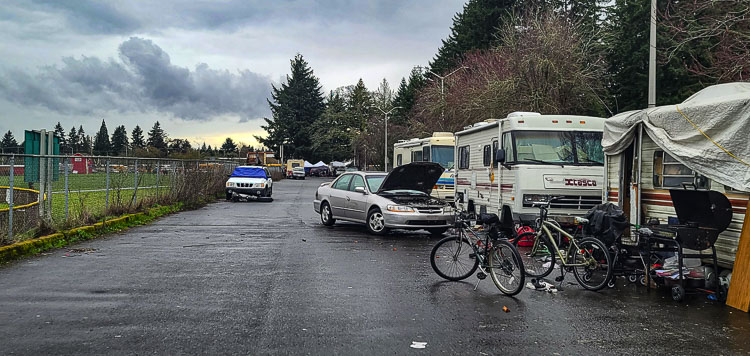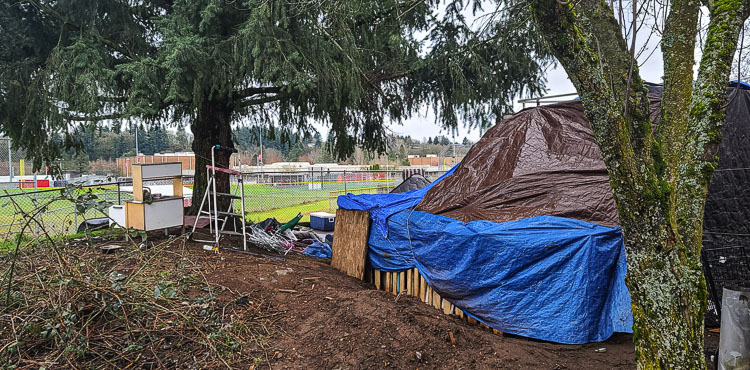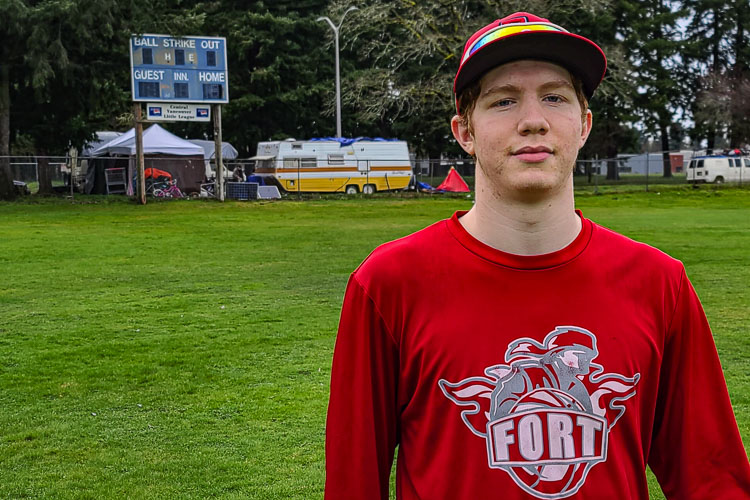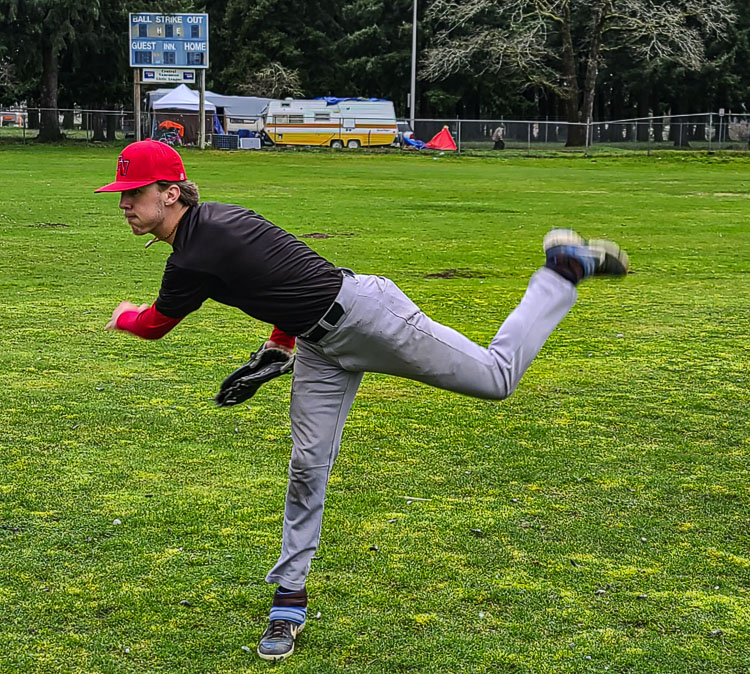Drug needles, human waste, other garbage routinely found on campus, on baseball fields
It is more than an eyesore.
It is a safety concern.
Drug paraphernalia, including used hypodermic needles, are found regularly on the athletic fields at Fort Vancouver High School. Human feces, as well.
A staff member’s car was broken into last week, and the baseball team has been robbed, with tools stolen from the shed near the dugout. In fact, more human feces was found in the shed after another break-in to that structure.
Power has been stolen from Alcoa Little League, which has its fields nearby.

Administrators, coaches, school security, players, and parents all have a pretty good idea of the source of these issues, and they are frustrated that nothing is being done about the homeless camps that have been built just on the other side of the fence.
Jeff Snell, the superintendent of Vancouver Public School, and Lon Pluckhahn, the deputy city manager, said that a meeting between the city and school district officials on Monday did not provide a long-term solution but they will continue to talk.
Those living in the camps are not on school property. They are feet from campus grounds.
Drug needles and garbage keep finding their way on campus, though. There are intimidating looks to those who get near the camp. On a recent visit, drug use was seen out in the open, not 50 feet from one of the fields that was being used by baseball players in the first week of spring sports practices.
“I feel like if this was at Columbia River (High School) or Skyview, this would have been handled and dealt with and we wouldn’t be talking about this,” said Justin Cvitkovich, the president of Alcoa Little League and a parent of students at Fort Vancouver High School.
“Since we’re Fort, I feel the public has a less than desirable look at Fort Vancouver High School and this is acceptable and OK,” Cvitkovich said. “I don’t think it should be any different.”

The homeless camps, with RVs, cars, trucks, tents, and tarps, are lined up along NE Campus Drive and a parking lot, behind the high school’s baseball and softball fields, as well as the Little League fields. Fort Vancouver track and field athletes are near the camps as well. One campsite is up against the fence where javelin throwers will be lining up when the school hosts track meets. Off in the distance is the school’s soccer field, as well.
Other than the school campus, though, these camps are in an industrial area. There are no homes visible from the baseball field, for example.
“Out of sight, out of mind,” Cvitkovich said as another possible reason he said the city does not seem to care.
No neighborhood residents are there to complain, after all.
The city, however, says its hands are tied. And the city, according to Council Member Bart Hansen, does care.
“I take the situation very seriously, regardless of what school it is at. I don’t look at Fort Vancouver as any different than another school,” Hansen said.

Parents at Fort Vancouver note the city’s municipal codes regarding daytime camping on public streets. They say it is clear to them that it is illegal and the city should move the campers.
However, recent court rulings have changed the way cities can handle homeless camps on public streets, Hansen said.
The Washington State Supreme Court ruled in 2021 that it is unlawful to tow a vehicle on a public street that is being used as a residence. (See Steven Long vs. the city of Seattle.)
Recent rulings by the 9th District Court of Appeals dealing with the homeless in Boise, Idaho, also have Vancouver city officials reluctant to make rash moves, Hansen said. The appeals court ruled that a city cannot move the homeless out of one area if there is not another area the homeless can go to reside. There are some exceptions, but the camps near Fort Vancouver High School, on city streets, is not one of them.
Hansen has heard from parents of Fort Vancouver students who want the city to make the people move.
“You take one of these actions that some people suggest, and you’ll get sued, and you’ll lose,” Hansen said.
Pluckhahn, the deputy city manager, said this situation near the high school underscores the city’s need to find a location for a second Safe Park. The first Safe Park, at the Evergreen Transit Center at 1504 N.E. 138th Ave., allows individuals who are living in their vehicles to have a safe place to stay. It has been operating since June 2020.
Dave Bennett is the director of athletics and school security for Vancouver Public Schools.
“It’s a frustrating situation for everyone,” Bennett said last week. “A sensitive situation, too. You do have people who are down on their luck, hard times, living there. It’s an uncomfortable situation.”
Bennett disagrees with folks who think the district does not care because the camp is next to Fort Vancouver.
“From our standpoint, we have cleared motorhomes from the Fort Vancouver parking lot,” Bennett said last week. “The camp behind the baseball fields, that’s the city’s property. We can’t do anything about that. We are working with the city to try to come up with a solution. We are working with (Vancouver Police Department) to report any incidents or crimes that happen. We have been in communication with them, as well.”
With a week before the first home baseball game, though, the camps remain.
“I have been shaking trees, trying to get anyone to respond to anything,” said Janeen Butterfield, a parent of a Fort Vancouver baseball player.
She said she has written several emails to city officials. She has contacted the police.
“There is a policy intact they are not enforcing,” Butterfield said. “We can’t have drugs within 1,000 feet of a school, but we’re allowing people with needles? It’s ridiculous.”
At a recent Class 2A Greater St. Helens League athletics meeting, a representative from Fort Vancouver asked the other athletic directors to advise their players and parents of the situation.
The parking lot normally used for fans of baseball games? Don’t want to park there now.
Fort Vancouver’s first home baseball game is March 14. If the camps are still here, what will happen?
“It’s going to add a lot more staffing and security, making sure fans are taken care of,” said James Ensley, the athletic director at Fort Vancouver.
That is already happening for the players and coaches who practice there every day. Security personnel are getting overtime due to the situation.
Bennett confirmed that the district is using its security and custodial personnel to conduct daily sweeps of the athletic fields. They look for discarded needles and other items that could pose a danger to the athletes. Two security officers maintain a presence for hours after school while spring sports practices are being held.
Ken Byers and Brenda Hall, district resource officers for Vancouver Public Schools, were on patrol last week when Clark County Today paid a visit.
It is their job to see if there is drug paraphernalia or broken glass on the fields.
“Once we clean that up, we let our admin know. After that, the kids get on the field. Then we keep a lookout for anything of concern,” Byers said. “That is very abnormal.”
Byers said that beyond the evidence of drug use, he has found used adult diapers on the school side of the fence, on the baseball field.
“In my 25 years, we’ve never done anything like this,” Hall said.
To be fair, no one associated with Fort Vancouver has heard of any threats from those living in the camps. There have been no accusations of violent crimes attributed to anyone living there.
Snell also is a former principal at Fort Vancouver, and before then he was an assistant baseball coach, coaching on those very fields. He said the district and city will have a presence there during sporting events.
“We’ll be out there to try to make sure we can navigate it safely and also be part of the discussion with the community for long-term solutions,” Snell said.
Pluckhahn said the city does clean up trash from the camp multiple times a week but could do more pick-ups during the spring sports schedule. Also, more city resources will be sent to the area during event days.
Alcoa Little League is seeing the effects of the camps, as well.
“Registration is already down because parents won’t sign their kids up because of the situation,” Cvitkovich said. “Parking is probably going to be an issue. Where we’d normally park is obviously preoccupied. That’s going to be challenging, to say the least.”
Alcoa does not have the resources to hire security. Cvitkovich said he will be asking parents to form a buffer zone between the camp and the players.
“I feel for the people. I don’t wish homelessness on anybody,” Cvitkovich said. “At the same time, it does attract … not all of them are bad but there are unsavory things going on.”
Alcoa Little League normally pays $22 a month for the meter on its power bill during the offseason. The league recently got a bill for more than $1,000.
“We can’t prove it was them, but not sure who else it would be then,” the president said. “I’m very frustrated.”
He estimates that registration is down 25 percent. He has called families who have been a part of the league in the past and asked why they are not returning. Many say it is because of the presence of the camps.
“They’re going to look for other things for (their children) to do. ‘We don’t want them around that. We’re concerned for their safety,’” Cvitkovich said. “I have nothing to come back with. I don’t have an answer.”
Opening day for Alcoa Little League is in April.
“We just want to get kids out here playing. After two years of COVID, I just want kids out enjoying baseball and enjoying time outside with their friends and get past what we’ve been through the last two years,” Cvitkovich said.
Looking at the camps on the other side of the fence, he added: “I’d hate the fact that people are not signing up because of that.”
Cvitkovich has a son on the Fort Vancouver baseball team. Kaeleb said being a student at Fort has its challenges.

“It’s an obstacle. Other schools like River and Skyview, they wouldn’t have this. They’d get rid of it,” Kaeleb said. “The city, … ‘Oh, it’s Fort Vancouver.’ It kind of sucks, but we have to fight through it. We have to play through it.”
In fact, he said the situation might make the baseball team closer.
“We’re going to be here. We’re going to be doing all these drills together. We’re going to be sweating together. We’re going to be fighting together,” Kaeleb Cvitkovich said. “As long as we have each other, that really doesn’t matter.”
Still, a ball hit toward the fence will have to be retrieved. As one school employee noted, not too many parents he knows would want their child to have to run to that fenceline to get the ball.
“This is about the kids,” said Rian Ludwig, a mother of a baseball player. “They want to feel safe when they are playing. These boys should be proud of where they are playing, and unfortunately, this deters them from that.”
Fort Vancouver senior Dylan Brooks-Minck is trying to make the best out of a bad situation.
“I’m just happy we can get our team out here and have a practice,” he said.

The players appreciate the school’s response, with the ever-present security.
At the same time, the situation is another black eye for the school.
“It does affect how people see Fort, especially if they come to our home games,” Brooks-Minck said.
Hansen, who was not in Monday’s meeting, said the city and school district will continue to work on the issue.
“Folks are concerned. I definitely hear that,” Hansen said. “We’ll see if there is a creative solution that can be had here. It is being worked on, I assure you of that.”





By now we know that criminals come,RICH,POOR,and IN-BETWEEN!! I ask myself,”who can afford it?” Criminals!! Alot of money made in criminal activity!! Stolen goods,drugs,prostitution,exct… homeless camps need to be looked at,without warning!! We would find,all of the above!! Sure,a few people down on their luck,that actually want to work,go to school and are drug clean. How long can they hold out,clean from criminal activities,without help??? As long as the government treats people with how much money,they don’t or do have,is just another place for the criminals to hide!!
We need a go fund me to sweep the homeless camps,(without their knowledge). Put the rapers,murders,druggies,exct
.. into jail,or prison,or back in a prison,where they ran from!!
I’m sure we,THE PEOPLE,would support a go fund me,to rent a warehouse,to lockThem up accordingly!! There are plenty of honest people out here that can be trusted!! In this day and age we cannot afford to give people working in our professional jobs,a second chance!! There are to many of us HONEST PEOPLE,that can do the jobs right,without a first chance!! Rich,Poor,and Between!!Let’s do it U.S. PEOPLE🇺🇲🇺🇲🇺🇲
Despite what some city reps may say, it is believed that it is true… if this mess was up in the east end of Vancouver, it would never have been allowed to remain in place.
It is sort of like Vancouver street maintenance… a few years ago (2?) the street out in front of the Vancouver Mall (Thurston?) got a rough coat of chip-n-seal. This surfacing agent is now breaking down, and the tire-travel grooves still retain water when it rains. However, the same summer, 164th Ave. got 3 inches of beautiful smooth blacktopping.
Please, oh please, don’t try to tell us that Ft. Vancouver H.S. is treated no different than any other school because that simply is not true.
Clean up the mess today! Move ’em out! Send ’em to the new homeless hotels that our tax money has been used to purchase and renovate. Or just put ’em on a bus, take ’em to the county line, and tell ’em don’t come back.
As for me, I’m sick and tired of seeing these drug-addled, mentally incompetent, lazy bums sponging off all the giveaways. Deep down, we all know that the percentage of the homeless that really want to get cleaned up, work, and make a go at life is infinitesimally small. To think otherwise is simply an effort to fool yourself.
We are heading into a depression,hard facts,(how can you ignore the prices going sky-high).
All clark county has to say is,”let’s build housing before there are no resources,to expensive to buy!! Then we will talk,infrastructure?? Double-Talking crap!! We need to stop building housing NOW and work on our infrastructure,NOW,While we can afford it!!
Many cities in washington State have!! Nothing is written in stone! It’s time to stop building and get ready for the inevitable future of a Depression!!
/